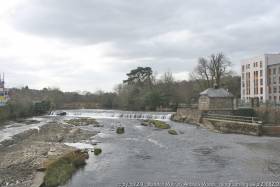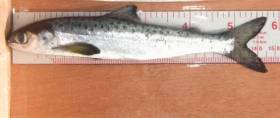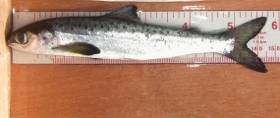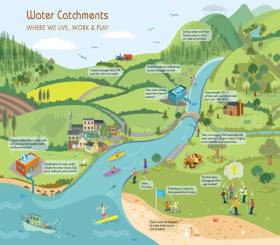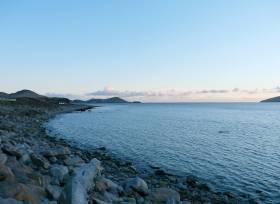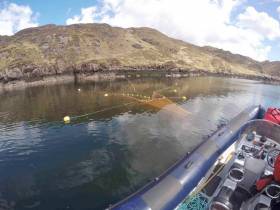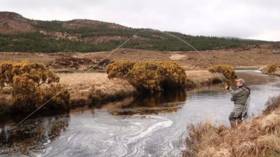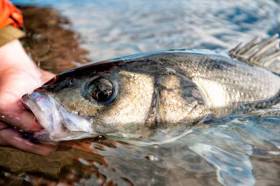Displaying items by tag: IFI
#Angling - Junior fishing clubs, youth clubs, projects and centres are invited to take part in a new competition by filming their angling adventures and spread the word about fishing online.
The Fish & Film Competition launched by Inland Fisheries Ireland (IFI) will see entrants film a fishing trip and include fun interviews on what angling means to them.
The films will be youth-led in content and production, with all junior anglers up to and including the age of 18 eligible to apply.
All films submitted to IFI will also be uploaded onto its YouTube channel and the public’s views on each film will count as votes.
The top three groups who reel in the most views on their film will go forward to a junior fishing competition which includes a free day’s fishing for all.
The overall winner of the Fish & Film contest will receive a €1,000 fishing tackle voucher for their club, with the two runners up winning a €250 voucher.
“We want to hear from the next generation of anglers to find out what fishing really means to them – why they enjoy it and why they think other young people should get involved,” says Suzanne Campion, IFI’s head of business development.
“If we are to increase domestic participation and secure the long term future of angling, then we need to engage with the next generation of anglers and learn more about their experience of angling in Ireland.
“We also hope they will help us encourage other young people to discover angling as a hobby and help them realise that it is a pursuit that can be enjoyed at any age or ability.”
The Fish & Film competition supports the objectives of IFI’s National Strategy for Angling Development, which aims to make angling accessible and attractive to all while establishing it as a key leisure pursuit.
There are currently 273,000 domestic anglers in Ireland, and IFI aims to grow participation rates by 0.5% annually.
The closing date for applications to Fish & Film is Friday 14 July. Click HERE for more information on the competition and to download the competition guidelines and application form.
#Jobs - A limited number of short-term (2-8 week) internships are available at Inland Fisheries Ireland (IFI) each year, intended to offer practical experience in fisheries science.
Dates are flexible depending on availability of supervisors and appropriate projects. Typical projects include fish ageing, environmental data entry and fish biology.
This year’s IFI internship slots have been filled, but applications for 2018 positions are now being accepted till the end of November.
Applicants will be selected on the basis of their application; no interviews will be held. For insurance and health and safety reasons, interns cannot usually participate in field work.
Internship applicants should submit a current CV, reference letter from a supervisor and a cover letter explaining their motivation for applying to IFI.
Applications should be sent to [email protected] or by post to:
Intern Application, HR
Inland Fisheries Ireland
3044 Lake Drive
Citywest Business Campus
D24 Y265
Ireland
Flood Relief Scheme Begins On River Bandon
#FloodRelief - The scheduled Bandon Flood Relief Scheme work programme for 2017 has now commenced on the River Bandon in Co Cork.
The scheme consists of a combination of flood defences and dredging of the river bed to a level of 9.5m downstream of the Bandon weir (about 1.8m below the existing bed level) in the town and at a grade of 1/1,000 until it reaches the existing bed level 3.6km downstream of Bandon town.
Some 150,000 cubic metres of material will be dredged in the scheme, while new flood defences will also be constructed to contain flood water within the Bandon and Bridewell Rivers as well as the Mill Stream.
Since July 2016, Inland Fisheries Ireland’s (IFI) local representatives have attended meetings with the contractor Wills Bros Ltd, the employer’s representatives (ByrneLooby/PH McCarthy) and environmental consultants to the contractor (Rivus) to review the specific methodologies proposed to undertake the works.
While maintaining a positive approach to the Flood Relief Scheme, IFI says it made proposals in relation to the proposed methods of dredging, sediment management and solids level monitoring, in order to minimise any potential negative impact on the habitat, fish and aquatic invertebrate populations of the river.
While there is some discolouration of the River Bandon expected downstream of the works, IFI says it is reassured by ByrneLooby/PH McCarthy that the Construction Environmental Management Plan (CEMP) and agreed sediment management and solids monitoring plans are being followed.
IFI will continue monitoring dredging works and will bring any non-compliance with the conditions set out to the immediate attention of ByrneLooby/PH McCarthy to ensure corrective measures are put in place.
Any repeated or deliberate non-compliances would be dealt with by IFI using its statutory powers.
#Salmon - Wild Atlantic salmon smolts migrating to sea from Irish rivers can become infected with sea lice from West Coast salmon farms and suffer increased mortality soon after leaving the coast, cutting their numbers by half.
That’s the conclusion of a new study published in international journal Aquaculture Environment Interactions, which used 30 years of data from the River Erriff in the West of Ireland to evaluate the effect of sea lice from salmon aquaculture on wild Atlantic salmon.
The study, titled ‘Quantifying the contribution of sea lice from aquaculture to declining annual returns in a wild Atlantic salmon population’, examined sea lice production from salmon farming in Killary Harbour and its effect on the return of wild salmon to the Erriff, at the head of the harbour, in the following year.
Results from this long-term study indicate that returns of wild adult salmon can be reduced by more than 50% in years following high lice levels on nearby salmon farms during the smolt out-migration.
Inland Fisheries Ireland says sea lice from salmon farming have long been implicated in the collapse of sea trout stocks along the West Coast.
But this latest study, authored by Dr Samuel Shephard and Dr Paddy Gargan from IFI, is “the first to clearly demonstrate significant losses of wild Atlantic salmon due to infestation with sea lice from salmon farms,” it adds.
Dr Shephard says: “There has been a lot of discussion as to the importance of the sea lice impact in the context of environmental variation and changing ocean conditions.
“We find that the predicted 50% reduction in 1SW salmon returns following a high lice year is greater than the average year-to-year variation attributable to environmental effects.”
Modelled lice impact levels and a fitted stock-recruitment relationship were used to estimate how annual returns of Erriff salmon might have looked over the last 30 years, in the absence of a serious impact of sea lice from aquaculture.
Results suggest that Erriff salmon returns could now be twice as large as without observed anthropogenic lice impacts, but would probably show a similar long-term decline.
The River Erriff is designated as a Special Area of Conservation (SAC) for Atlantic salmon under the European Union Habitats Directive (92/43/EEC). Salmon smolts from the Erriff can be followed via a new online tool, as previously reported on Afloat.ie.
Dr Gargan explained that increased mortality of wild salmon due to the impact of sea lice can result in salmon stocks not reaching spawning targets or not being at favourable conservation status as required under the EU Habitats Directive.
It is therefore critical that sea lice levels are maintained at a very low level on farmed salmon in spring – and where this has not been achieved, that farmed fish are harvested before the wild salmon smolt migration period.
The authors conclude: “Many Atlantic salmon populations are already under pressure from (possibly climate-mediated) reductions in marine survival. The addition of significant lice-related mortality during the coastal stage of smolt out-migration could be critical.”
Follow Salmon Smolts In River Erriff Via New Online Tool
#SalmonSmolts - Inland Fisheries Ireland (IFI) has launched the SMOLTRACK project, which gives the public the opportunity to follow the numbers of juvenile salmon making their journey down the River Erriff.
The EU-funded NASCO project will see IFI work alongside partners in Northern Ireland (River Bush), England (River Tamar), Spain (River Ulla and River Tea) and Denmark (River Skjern) in rolling out a counting, tagging and tracking system.
Traps are used to catch migrating salmon smolts for tagging before releasing them to continue their migration journey. In order to provide stakeholders – angling enthusiasts included – with the opportunity to follow and compare the migration timing of smolts in several countries, the daily numbers of salmon smolts counted in each system is uploaded for online viewing.
In Ireland, tagging is being carried out on salmon smolts from the Black River, a tributary of the River Erriff, which itself is the National Salmonid Index Catchment (NSIC).
The Erriff in Co Mayo is one of the premier salmon fishing rivers in Ireland and its smolt run typically occurs over six weeks during April and May. This year, the smolt run commenced on the river on Monday 3 April, with 289 salmon smolts counted on the system as of today (Monday 24 April).
The salmon smolts are tagged with miniature acoustic transmitters and their subsequent migration is followed via acoustic listening stations situated at various locations.
This information will help scientists to understand the survival rates of salmon smolts during their migration through the lower parts of rivers, estuaries and coastal areas, in addition to providing data on smolt run timing and migration behaviour.
The project will provide new data which will inform future salmon management and conservation work.
“This is an exciting project which will allow us to gather new information around the survival and timing of salmon smolts journeying seaward through the River Erriff, and into and through inshore coastal waters,” says Dr Cathal Gallagher, IFI’s head of research and development.
“We look forward to determining more about the smolts once they have been tagged by following their migration journey. As we are working with partners in Northern Ireland, England, Spain and Denmark, we can also learn from the data gathered in their regions.
“Ultimately, this information will inform our work in the area of salmon conservation which will prove invaluable to Ireland’s fisheries resource in the long term.”
New Waters & Communities Awards For Tidy Towns 2017
#InlandWaters - Waterways Ireland has partnered with Inland Fisheries Ireland and Local Authority Waters and Communities Office to create a new Tidy Towns Special Award for 2017.
The Waters and Communities Award and has been established to recognise communities who are taking positive steps towards raising awareness and showing appreciation of their local rivers, canals, lakes, streams, coast and ground water.
Four Regional Award winners will receive €1,000 each, with €500 each for four Regional Runner Up winners. There will also be a prize of €1,000 for the overall winner of the four regions.
All entries will be assessed by a panel of judges appointed by Inland Fisheries Ireland, Waterways Ireland and the Local Authority Waters and Communities Office.
You can apply for this award by downloading and filling out the entry form (also available as Gaeilge) and returning it before the closing date of Thursday 25 May by email at [email protected] or post to:
TidyTowns Waters and Communities Award
TidyTowns Unit
Department of Arts, Heritage, Regional, Rural & Gaeltacht Affairs
Government Offices
Ballina, Co Mayo
F26 E8N6
Waterville Locals & Business Invited To Info Event On Opportunities In Angling Tourism
#Tourism - Waterville Lakes and Rivers Trust is hosting an information event on opportunities in angling tourism for business owners and the public in Waterville and surrounding areas later this month.
The event, which takes place at The Sea Lodge in Waterville, Co Kerry on Thursday 27 April at 7.30pm, will focus on sharing results from a recent economic survey carried out in Waterville among angling tourists to the area.
The research reveals some key opportunities for business and service providers in the locality.
The Waterville Anglers Survey queried 207 anglers visiting the area and found that on average, angling visitors spend €644 per fishing trip, or €114 per day.
The impact of this expenditure is far reaching across the local community, with €451 spent on non-angling items such as accommodation, restaurants/cafés and groceries, and €193 of angling expenditure on items such as angling guides, boat hire and equipment.
This daily spend of anglers in Waterville (€114) far exceeds the spending of non-angling visitors to Ireland. Fáilte Ireland’s Tourism Facts Report 2015 cites expenditure of non-angling visitors and holiday makers at €68 and €89 respectively per person per day in 2015.
The research, which was carried out by Inland Fisheries Ireland with Waterville Lakes and River Trust, highlights the significant recreational and economic value of the fisheries resource to the area.
Rod Robinson, spokesperson for Waterville Lakes and Trust, said: “Waterville is a popular destination for anglers and this research shows us the huge economic contribution they make to Waterville and the potential opportunity which exists for the community.
“We are inviting the public, business owners and tourist operators to come along and hear more so that together we can grow our offering around the fisheries amenity.”
Suzanne Campion, head of business development at Inland Fisheries Ireland, added: “We know at a national level that the fisheries resource contributes €836 million to the Irish economy annually but this local research also tells us that there is significant value of angling tourists to this community.
“We also note that the research once more confirms that angling visitors spend more than non-angling tourists and that they visit outside of the traditional tourist season, supporting local businesses and jobs while doing so.”
The information event is open to all to attend. For more details, contact Rod Robinson at Waterville Lakes and Trust via email at [email protected].
Bag-Nets & Sentinel Cages Deployed At Killary Harbour
#MarineNotice - Inland Fisheries Ireland (IFI) will be carrying out scientific sampling using bag-nets and sentinel cages in Killary Harbour and surrounding waters from this week.
The bag-nets will start at the shore and extend into the water approximately 25 metres. The sentinel cages (nets) will be anchored near-shore and will not interfere with navigable waters.
All nets will be clearly marked with brightly coloured buoys with IFI identification so that any unintentional retrieval can be notified to IFI through the contact details provided.
Deployment operations will be carried out using an IFI RIB, Sea Breeze (Callsign EI-5724; MMSI 250002937), and will take place today Monday 3 April, subject to weather conditions. The nets will be checked daily (weather dependent) and all sampling nets and buoys will be retrieved on Friday 2 June.
A map and co-ordinates of the relevant locations are included in Marine Notice No 16 of 2017, a PDF of which is available to read or download HERE.
Permit Reminder For Anglers As Gweebarra Fishery Opens
#Angling - Inland Fisheries Ireland says it is fully committed to the ongoing protection of the Gweebarra fishery in accordance with the High Court judgement of Justice Laffoy delivered on 19 December 2012.
Anglers wishing to fish the Gweebarra fishery from the opening of the angling season tomorrow (Saturday 1 April) are required to have a valid licence and permit, which are available from the village shop in Doochary, Glenties Angling Centre (phone 074 955 1141) or online from Donegal Angling Holidays.
A halt on fishery offence summonses, as previously reported on Afloat.ie, has prompted IFI to withdraw a number of cases, including those related to the Gweebarra fishery which were before the Donegal courts in recent days.
However, in the interim all current provisions and offences of the Inland Fisheries Acts continue in fill force and effect, and any alleged offenders remain liable to prosecution.
Rosslare Man Convicted Of Illegal Bass Fishing On Wexford Coast
#Bass - A Rosslare man pleaded guilty on two charges of illegal fishing for bass at a sitting of Wexford District Court on Tuesday 28 March.
Fisheries officer Stephen Byrne outlined how Inland Fisheries Ireland (IFI) intercepted Declan Ellard in possession of three wild bass and an 80m floating net at Carne Pier in Co Wexford on 14 April 2016. Ellard was also observed servicing the net using a boat.
Ellard had previously accepted under oath that he would never fish again at a Circuit Court hearing in 2012, during which he was prosecuted for illegal bass fishing by the Sea-Fisheries Protection Authority (SFPA).
As a result of his prior conviction, prosecuting solicitor Caitriona Walsh sought an adjournment so that the matter could be dealt with in the Circuit Court with the consideration of the SFPA. Judge Chettle proceeded with the case and fined Ellard €400.
Net fishing for bass is illegal in Ireland due to low stock numbers, with angling for bass in the South East of Ireland on a ‘catch and release’ basis from January to June and a bag limit of one fish per day for anglers from July to December.
IFI and the SFPA have powers of prosecution for illegal bass fishing under the Bass (Conservation of Stocks) Regulation 2006. Those convicted of this environmental crime can be fined up to €5,000 per charge.
Angling contributes €836 million to the Irish economy annually and bass angling is a valuable resource to the South East of the country. Bass and sea anglers alone, including domestic and those visiting from abroad, have an annual expenditure of €168.6 million annually, which supports businesses and jobs in coastal communities nationwide.
David McInerney, director of the South Eastern River Basin District said: “This conviction under the Maritime Jurisdiction Act highlights that illegal fishing in the South-East will not be tolerated.
“Our fisheries officers are patrolling the waterways in overt and covert operations during the day and night with the aim of protecting and conserving this valuable fisheries resource which supports communities and provides a recreational amenity for all.”





























